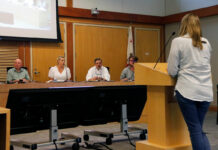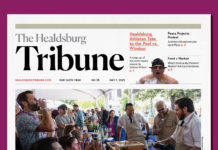The Measure I SMART train question on the March 3 Primary Election ballot is important enough for voters to think for themselves and not be duped by all the slick and colorful mailers and the rest of the $2.3 million vitriolic and bombastic pro and con campaigns, now filling mailboxes and social media feeds.
Voters should take the time to read their voter information guide which includes an impartial fiscal analysis, the text of Measure I and also quieter and more reasonable printed and signed arguments. Read the “whys” for supporting or opposing the extension of the quarter cent sales tax in both counties through 2059.
Measure I is asking voters to extend the tax nine years ahead of the original schedule so SMART officials can refinance their debt and save $12.2 million a year. Without the approval of the extension on March 3, SMART officials say they must cut $9 million (a 23% budget reduction) in operations and services. They say all future expansions, including tracks and service to Healdsburg and Cloverdale, would be suspended indefinitely.
Measure Q was passed in 2008 by 70% (66% was required) of Sonoma and Marin voters, who knew then that SMART would always need many sources of subsidies to add to daily rider fares. The largest of any North Bay public infrastructure project was hit hard by the 2008 Great Recession, and the original plan for 71 miles of tracks and service from Marin to Cloverdale was cut to 41 miles between Santa Rosa and San Rafael. Construction costs almost doubled, and the first trains only started two years ago, five years behind schedule.
As impartially as we can say this, a vote for Measure I would be much more of a vote for hope and potential rather than any vote of confidence. Large swaths of SMART’s history are filled with missed goals and deadlines, errant projections and over-promising. SMART general manager Farhad Mansourian didn’t improve voter confidence when he recently refused to make public current ridership statistics when requested by local newspapers.
If current SMART leadership could point to more credible answers, more solid and verified cost analysis and bolder, fresher thinking about its longer-term vision then its past history of undeliverables might look less egregious.
When the best argument is “do it for the good of the environment,” that doesn’t excuse the current operations of poor safety and no answers for the people of Healdsburg, Cloverdale and the north county.
Supporters point to the 41 miles of tracks built and the 1.6 million passengers served. They are especially proud of the recently opened service to the Larkspur Ferry Terminal. Without SMART, the North Bay would be ineligible for millions of future state and federal transportation funds. This would make the answer to Highway 101 congestion and pollution farther out of reach.
SMART officials give an unconvincing reason for rushing ahead with the 30-year tax extension so far in advance of the original deadline. Does saving $12 million a year justify voters approving a $3 to $4.2 billion tax extension?
The North Bay needs more and better public transit and transportation infrastructure. It needs its rural roads improved, and it needs a better mass transit network of buses, para-transit, multi-use paths and clean energy fleets. A major backbone of this infrastructure should be a safe, adequately-funded and fully-realized SMART.
Is Measure I an investment in that future plan, or is it just a stop-gap funding ploy by current SMART leaders? We all want to spend less time in traffic jams on Highway 101, and none of us believe our best path to the future on this planet is in a single-occupant vehicle.
Supporting Measure I and the kind of future public transportation we all want shouldn’t be this tough of a vote to support. But it is.
— Rollie Atkinson









